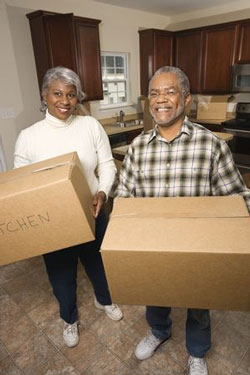 When planning a move into assisted living, it can be hard to decide what to do with personal possessions. Our emotions tell us that the things we accumulate over our lives — photos, mementos, books, clothes, even furniture— tell the story of how we came to be who we are today. But practicality dictates that we can’t keep it all.
When planning a move into assisted living, it can be hard to decide what to do with personal possessions. Our emotions tell us that the things we accumulate over our lives — photos, mementos, books, clothes, even furniture— tell the story of how we came to be who we are today. But practicality dictates that we can’t keep it all.
In this post, we’ll discuss how to pare down the trappings and focus on the things that really matter.
Moving doesn’t mean you can’t bring things with you.
Few of us enjoy living in clutter.
It’s smart to downsize, rather than stuff things into tighter spaces just as you would moving from a house to any other apartment. But in an assisted living apartment, clutter may not be safe— for you or the staff.
Obstacles on the floor, things stored in high or hard-to-reach places, and heavy drawers or chests can create problems— especially if you have more limited mobility.
That doesn’t mean you can’t bring anything.
You’ll need your wardrobe, day-to-day items, pictures, and important knick-knacks. Some assisted living communities even allow residents to bring some of their own furnishings. But naturally, you’ll find yourself needing to make some choices.
“To attach is to suffer.”
This basic tenet of Zen Buddhism applies to how we approach the problem of having more things than we can realistically take with us into assisted care.
We all know, rationally, that material possessions don’t think or feel. But when we attach our own emotions to them, those inanimate objects can seem like old friends. When planning ahead, begin allowing yourself to think of things as merely things. The memories you associate with those objects are your own; no person can take them from you. And if we are being honest with ourselves, objects that only bring up only one time, place, or event are probably not among our most important.
If you keep one thing, another must go in its stead. Prioritize.
That t-shirt you got on the boardwalk in Atlantic City in 1972 may remind you of a wonderful day you had with your kids, but can you still wear it or is it just taking up space? If it is a particularly dear memory, and you feel you need to keep the t-shirt as a memento, that’s ok.
But it does mean giving up something else—the Barry Manilow album your wife gave you on your third Christmas together or the beat-up copy of All the President’s Men you bought the day after you met Bob Woodward in a coffee shop.
You might try developing a ranking system. Give strong weight to the things you see, touch and use every day and lesser importance to things you use, but don’t need everyday.
Consider the cost of upkeep before you decide what to do with it.
You may own an item, but remember that to store it, you must have space. To have more space, you must pay more in rent, mortgage, or other monthly fees. And the more space you have, the higher the utilities will be to serve that space. The more things you wish to bring with you to a new residence, the more you have to pay the movers.
Just because you own something doesn’t mean you are done paying for it.
You might look at your downsizing efforts, too, as a way to raise money—for your future care or for a favorite charity. Having a large rummage sale can get rid of unneeded possessions, and give you some extra money to spend on making new memories— taking your spouse out to a lovely dinner, replacing outdated items, or supporting underprivileged children in the community.
Remember, planning your move to a senior community or into assisted care doesn’t mean you have to get rid of what’s important to you. You just may need to take some time, plan ahead and make sure you know what the most important things are.












